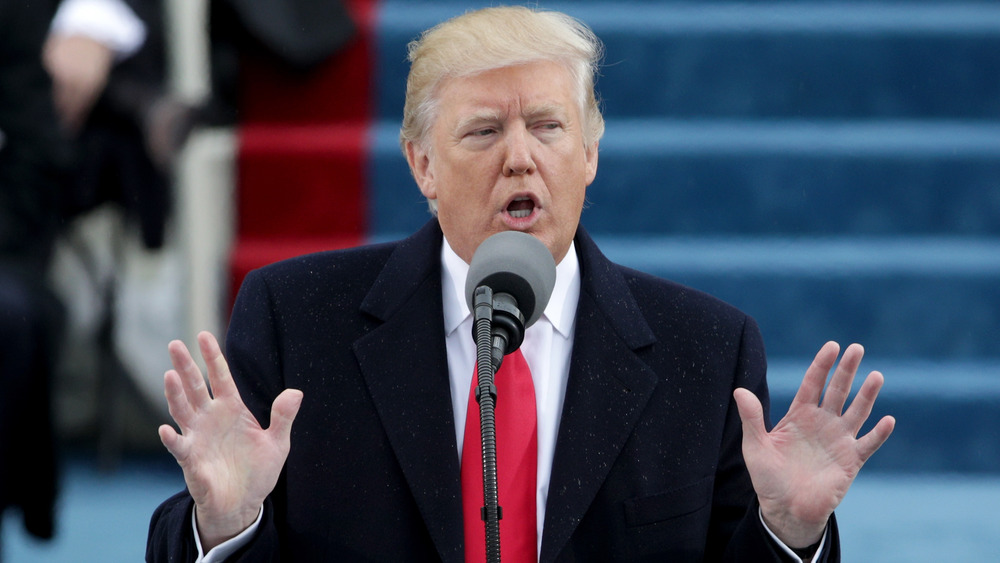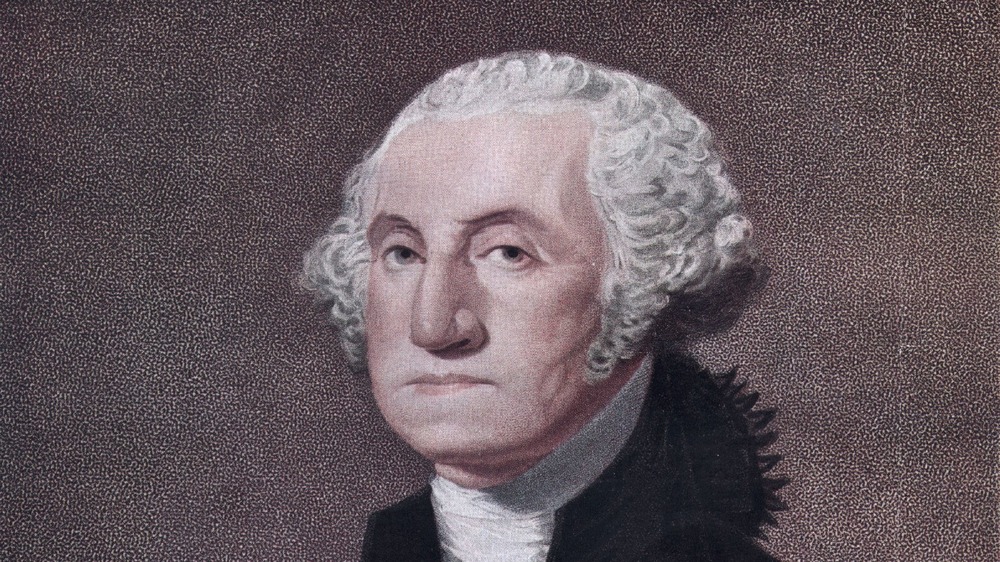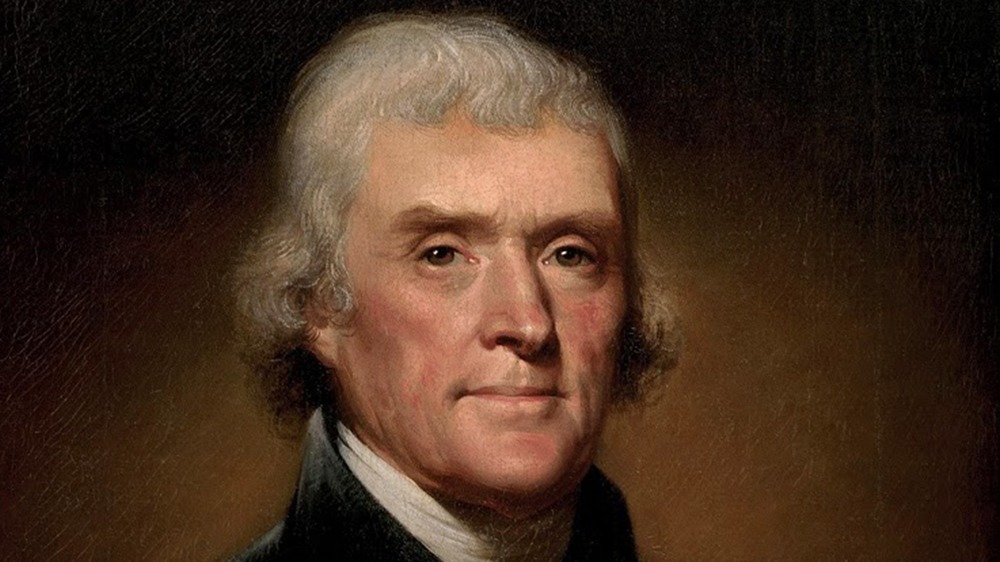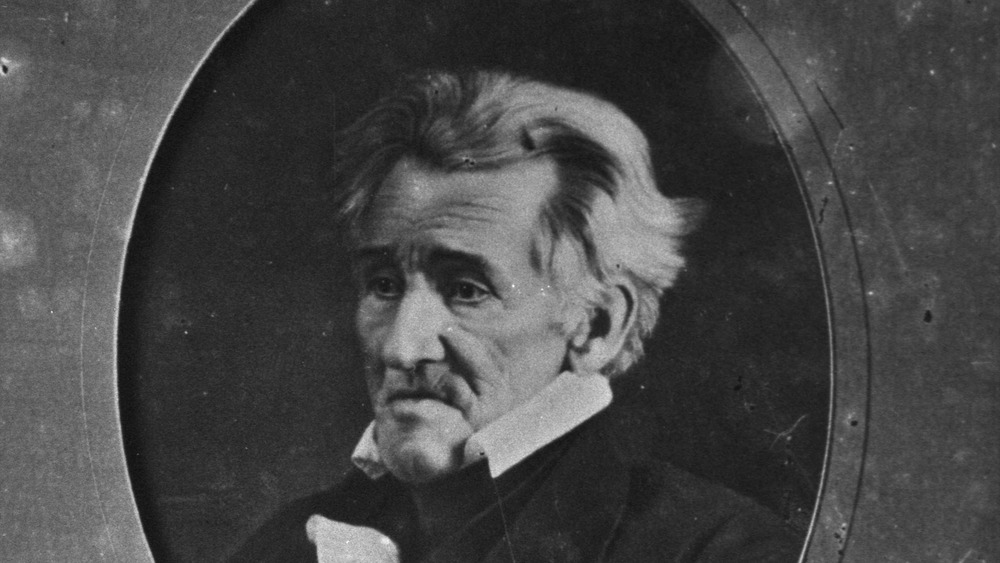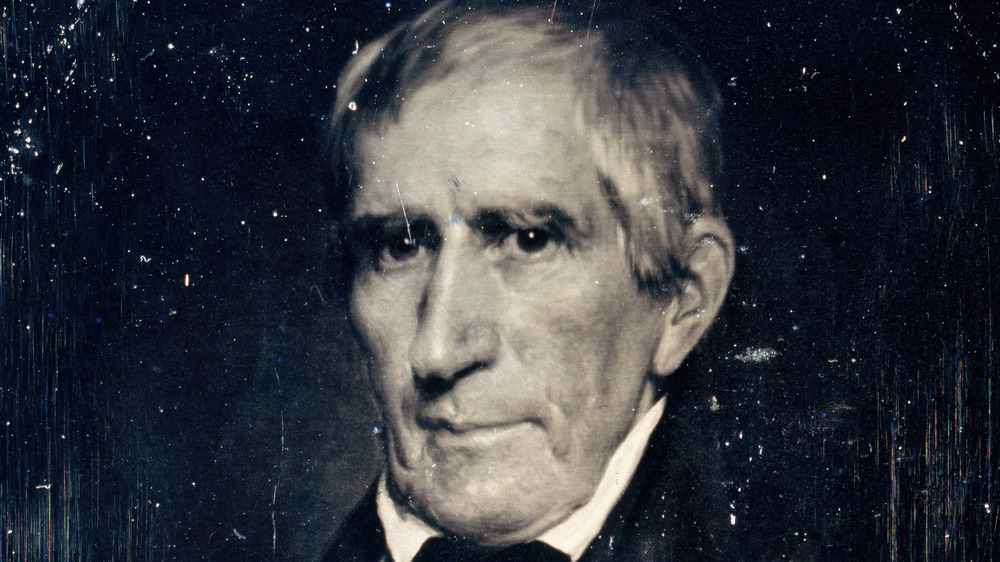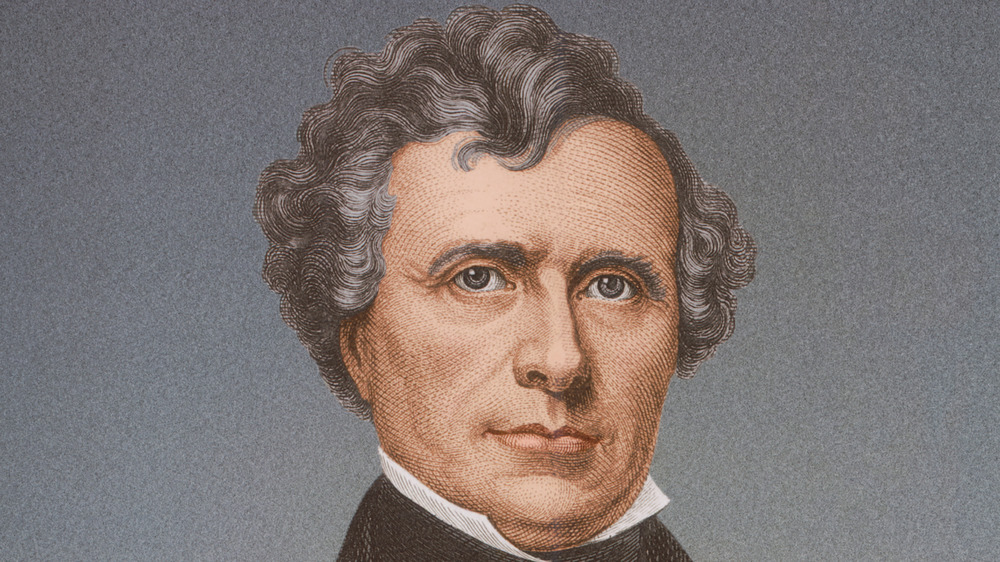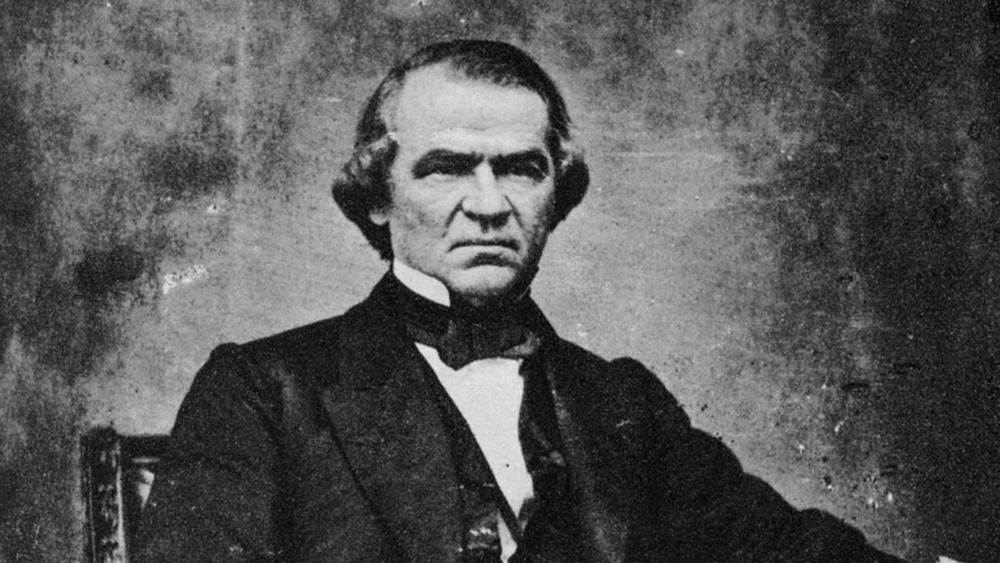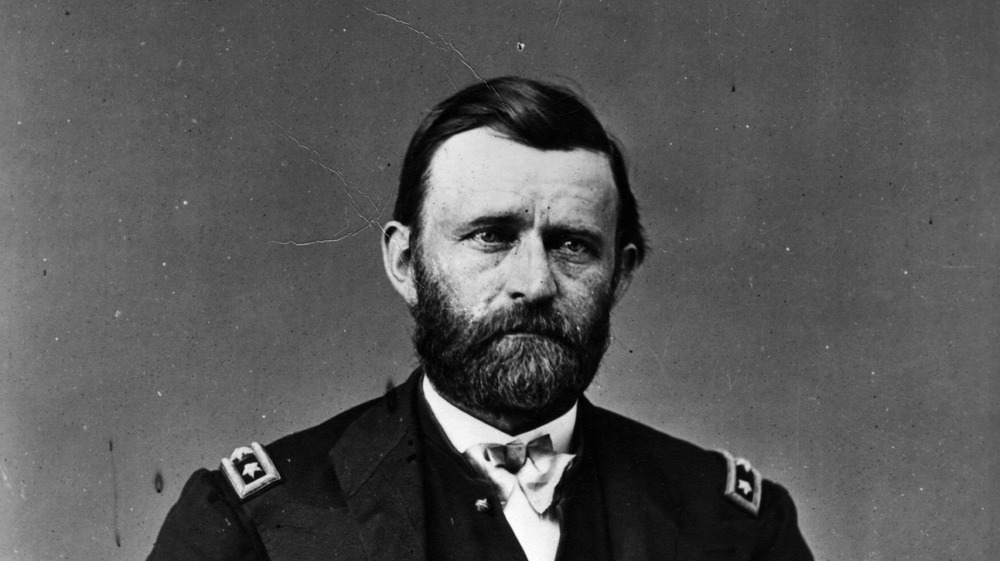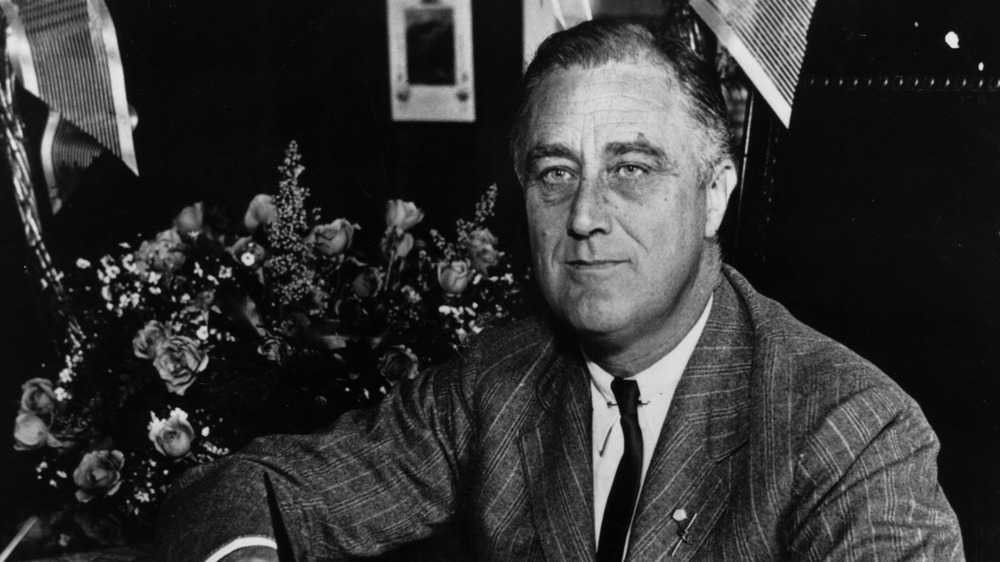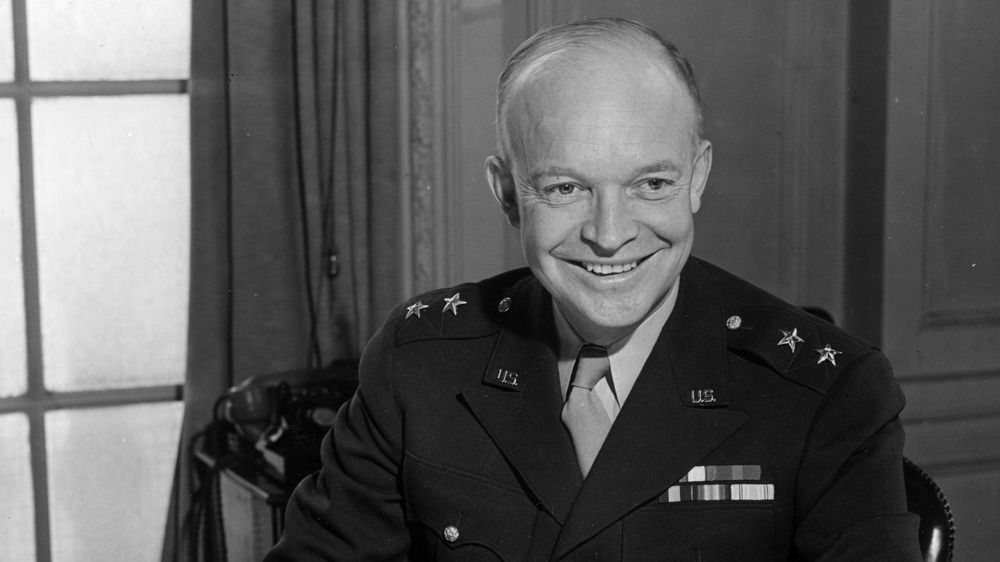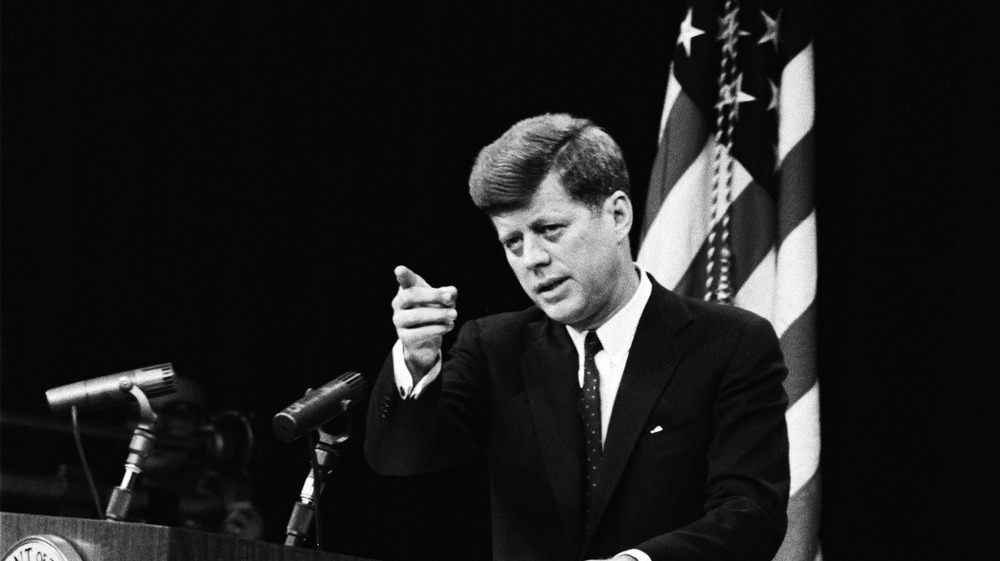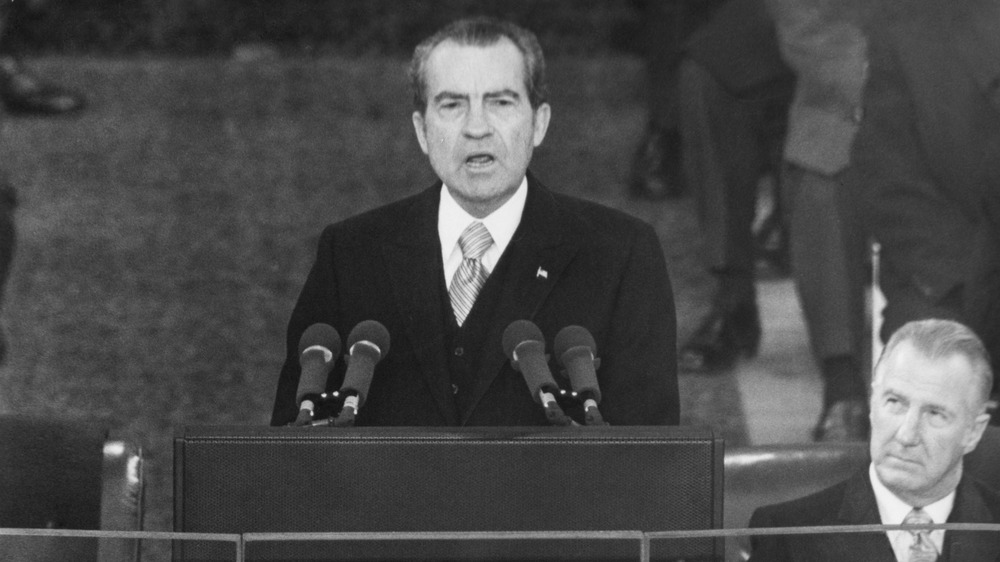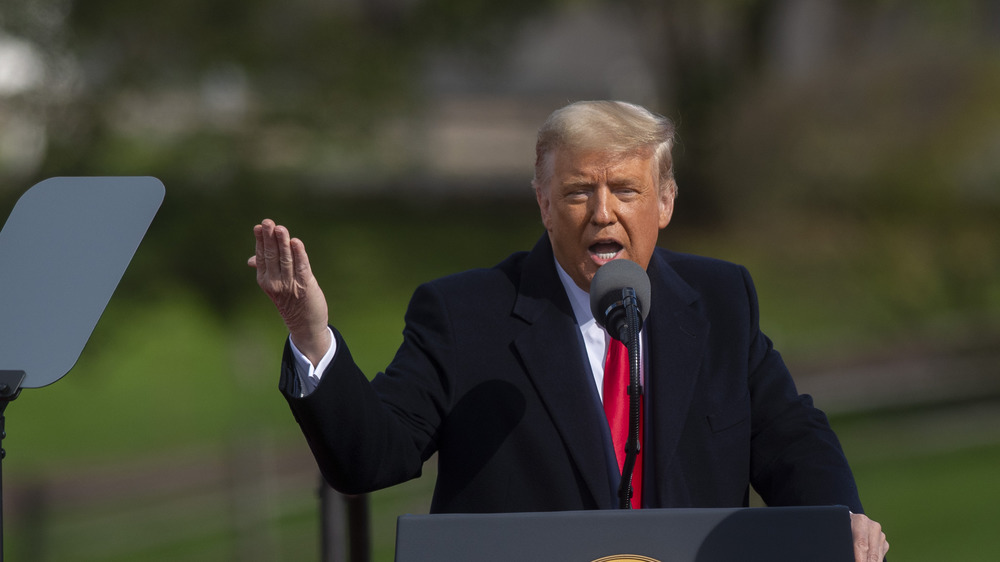The Most Awkward Inauguration Day Moments In History
Let's face it: It's becoming increasingly unlikely that President Donald Trump and President-Elect Joe Biden will be anywhere near each other during the January 20th inauguration. Previously, NBC News speculated that Trump would be launching his 2024 campaign during that time — but after the January 6 insurgence, he may have other, more pressing, issues to contend with, namely an invocation of the 25th Amendment. Who knows ... Trump and Biden may not even be in the same country during the inauguration.
Regardless of what goes down on January 20, it won't be the first awkward presidential inauguration in United States history. The truth is that inaugurations are frequently awkward affairs, in no small part due to the volatility of America's politics. When you get two people in a location who have spent months tearing into each other in highly public ways, it's hard to turn it off for a celebration. And since you're already throwing a huge party during the dead of winter, there are a lot of practical elements that can go awry.
So, let's take a look at some of the most awkward moments that have happened in Inauguration Day history.
1789: George Washington's inauguration was very nearly a disaster
Not only was George Washington's inauguration 57 days late (Congress was unable to get a quorum together), but when he was about to be sworn in, they had to borrow a Bible from a nearby Masonic lodge — which, according to the National Archives, still owns it.
Of course, it's hard to say that George Washington's inauguration was atypical, since the United States had never done one before. In some ways, it went better than many inaugurations after it: For one, Washington was confirmed with 100 percent of the electors voting for him. But the most awkward part of Washington's inauguration wasn't the inauguration itself — it was the fact that Washington was miserable throughout.
According to contemporary witnesses, as reported by Smithsonian Magazine, Washington was anxious, embarrassed, and agitated during the ceremony. Not only was he shaking, but he whispered his speech so low as to be essentially inaudible. And his speech itself acknowledged that "no event could have filled [him] with greater anxieties." But perhaps that was what made him worthy of the position.
1801: John Adams skipped President Thomas Jefferson's inauguration
Feuding between John Adams and Thomas Jefferson was so high during their campaigns that Adams didn't attend Jefferson's inauguration. This could have been due to the awkwardness engendered — or perhaps Adams literally didn't want to start a street fight.
The personal and political relationship between Jefferson and Adams was complex. During the 1796 election, Adams (a Federalist) and Jefferson (a Democratic-Republican) had run against each other, with Adams winning. But, back then, the second runner-up became vice president, regardless of party lines. So, for four years, Jefferson and Adams (who had previously been political allies) were forced to butt heads.
According to History.com, the resultant presidential campaign was one of the most brutal in American history. Adams was accused of having a "hideous hermaphroditical character" by Jefferson's backers, while Jefferson himself was accused of being a "mean-spirited, low-lived fellow" by Adams' supporters. It was, undoubtedly, one of the most notable smear campaigns in America's history.
Thus, Adams took a stagecoach out of the city before Jefferson's inauguration occurred — and they didn't talk to each other for another 12 years.
1829: President Andrew Jackson's inauguration became a rowdy party
To understand the volatility of Andrew Jackson's inauguration, you must first know that it was the second time he'd run against John Quincy Adams. In 1824, Adams and Jackson had faced off against each other — and Jackson had won a plurality in both the popular and electoral votes. Despite this, Adams was elected as president.
Adams had been chosen by the U.S. House of Representatives after a four-way split in the electoral college vote, which left no candidate with the required majority – but many decried this as a stolen election. Thus, by the election of 1828, temperatures were high. It was perceived that Adams was the man "of the politicians" but that Jackson was the man "of the people."
This set the stage for the inauguration in 1829 — a wild, rowdy, open-house party at the White House that included 20,000 people, per History.com. Guests in muddy shoes stood on furniture, dishes were broken, food was dropped everywhere, and servants had to lure people out onto the lawn with promises of whiskey. Jackson himself became trapped against a wall and had to be pulled out of the house and taken to the National Hotel, according to The White House Historical Association.
1841: President William Henry Harrison spoke for two hours in the freezing cold
There was no blood feud going on during William Henry Harrison's inauguration. Rather, the awkwardness was of his own design and his own making. His speech, 8,445 words long, droned on for a bit shy of two hours and is still the longest in American history. CNN notes that the second-longest speech was still only 5,000-some words long.
Not only was President Harrison's speech long, but it was delivered in the chilling cold. Also, Harrison refused to wear a coat or hat at his inauguration: He was a proud man with a celebrated military record, and he did not want to appear weak. (Fellas, is it considered unmanly to wear coats?)
Harrison ultimately fell ill and passed away from pneumonia only 31 days after taking office — his is still the briefest U.S. presidency in history. But while rumor may have claimed that Harrison died due to his long speech, it's likely not so: To die 31 days after taking office, he more likely became ill a couple of weeks later.
So, what was the content of this famously long speech? It's preserved in entirety in places such as the Lillian Goldman Law Library, but the truth is that the content isn't exceptional. Instead, it's a long, rambling treatise about the political process.
1853: After a tragedy, President Franklin Pierce declined to swear the oath on the Bible
Called the "saddest president" by The Washington Post, President Franklin Pierce's inauguration was understandably tragic. During Pierce's inauguration, he refused to swear his oath on the Bible — after having seen his 11-year-old son killed and nearly decapitated.
Pierce was the 14th president of the United States, and he's often forgotten, as his wasn't a particularly eventful presidency. Just before Pierce's inauguration, he, his wife, and his son were traveling by train, and they were already coming from a funeral (one of the few reasons to travel back in those days). The train car that the family was in was derailed and tumbled down a hill. Several people died, including Pierce's own son. But that's not all: This was the third son that Pierce had lost. The first died a few days after being born, and the second died at four from typhus.
So, it's understandable that Pierce assumed that this latest calamity was personal and that God was punishing him in some way. Pierce's wife did not attend the inauguration – she also believed that the family was cursed.
1865: Abraham Lincoln's vice president, Andrew Johnson, was visibly drunk at his inauguration
Even longtime politicians can end up with the jitters. During Abraham Lincoln's second inauguration, Andrew Johnson drank a few medicinal whiskeys and was visibly drunk and rambling throughout the ceremony. Lincoln would later apologize for the display, declaring it atypical of the man, who had recently recovered from typhoid fever.
According to the United States Senate, Johnson ranted at the crowd about not only about his own "humble origins" but also his "triumph over the rebel aristocracy." The audience was silent, Lincoln was embarrassed, and one senator merely face-palmed. But, eventually, Johnson calmed down, kissed the Bible, and took the oath. After that, while he tried to swear in new senators, he quickly became confused, and a Senate clerk took over for him.
But Johnson wasn't necessarily wrong about his rant. He had come from humble origins, being raised in a log cabin in North Carolina, building a business as a tailor, and educating himself. And, of course, he would eventually become president.
1873: President Ulysses S. Grant's second inauguration occurred in the bitter cold
Planning a big party was a little more complicated when you couldn't just check a weather app. The inauguration has pretty much always been held in the winter months ... in the North. Originally, it fell in March, but now it falls in January. So, it was always expected to be a bit inhospitable. But the inauguration of Ulysses S. Grant was exceptional.
During Grant's inauguration on March 4, 1873, the recorded temperature was 16 °F. But due to the wind chill, it likely felt closer to somewhere -15 °F and -30 °F, according to WETA. It was so cold that cadets were sent to the hospital with frostbite. And because the inaugural ball had been set to take place in an uninsulated structure, guests remained chilled all evening.
Even worse, hundreds of canaries had been set up in cages above the ball. Understandably, they froze to death due to the weather — though The Washington Post reports a rumor that they may have died due to the gas lamps. Either way, the temporary wooden building was not only frozen but also raining dead birds.
1933: President Franklin D. Roosevelt's inauguration was awkward and angry
Let's get back to some good, old-fashioned anger. Franklin D. Roosevelt and Herbert Hoover spent the majority of Roosevelt's inauguration in stony silence, having fought each other to the point of contempt regarding the "New Deal" proposals. Hoover had called Roosevelt "a chameleon on plaid," a scathing indictment we have to assume made more sense in 1932. But the animosity extended beyond the inauguration.
According to the Center for Presidential Transition, Hoover and Roosevelt failed utterly to work together during the four months of transition – a particularly delicate time. Hoover regarded FDR as childish and trollish, whereas Roosevelt had attacked Hoover for "reckless and extravagant spending."
Just as there have been many awkward inaugurations, there have also been quite a few awkward presidential transitions. With every new president, the White House must go through months of time transitioning from one leadership to another. During the Great Depression, it was perhaps inevitable that politics would run volatile. But it's equally possible that a more organized transition in the White House would have aided and improved economic recovery.
1953: President Dwight D. Eisenhower broke multiple traditions during his inauguration
On inauguration day, Dwight D. Eisenhower skipped coffee with Truman — and refused to greet him before the ceremony. Once again, it was a campaign issue: They had worked together successfully before, but their relationship had grown cold.
By the end of the campaign, Eisenhower was said to have regarded Truman as "inept" and "undignified" – surrounded by political yes-men. He openly criticized Truman's foreign policy and vowed to fix it himself. Truman was, himself, angry at Eisenhower's criticism insofar as he believed that Eisenhower had been on his side before the presidential campaigning.
Those weren't the only ways in which Eisenhower's inauguration broke from tradition. He also refused to kiss the Bible and presided over a large inaugural parade, eventually being lassoed by a cowboy and trick roper – with the permission of the Secret Service. One might find it hard to imagine such antics taking place today.
According to the Federal Highway Administration, after the inauguration, Truman would be met with apologies from reporters, stating that they hadn't meant a word of the onslaught they'd sent his way for the past eight years. Nevertheless, the news media would continue to have a persistent role in the perception of presidential candidates.
1961: President John F. Kennedy's podium caught fire
John F. Kennedy's inauguration occurred after eight inches of snow had fallen the previous night, which made it difficult to clear the streets and left glaringly bright white snow everywhere in view. There were a few big issues with JFK's inauguration that are often forgotten today, as noted by ABC News. First, the vice president made a mistake during his oath. Second, the podium caught fire due to an electric short. And third, the poet Robert Frost was unable to read the poem he intended to, due to glare.
But few people talk about this today because JFK's inauguration — and his inauguration speech, preserved in the JFK Library — was such a momentous event in American history. For many, JFK represented a new and youthful hope: an optimism that the country might not see again. Including what is arguably JFK's most memorable line ("Ask not what your country can do for you. Ask what you can do for your country"), JFK's inauguration speech is still believed to be one of the best ever written. And his speech was a mere 14 minutes, compared to Harrison's two hours.
So, it was easy for people to forget that just before then, as Cardinal Cushing was giving his speech, the podium had caught fire — and the Secret Service had to rush in to take care of it. Once again, it was an issue with the weather: A faulty heater had been set up behind the podium to keep the speakers warm.
1973: President Richard Nixon's inauguration was disrupted by a rooster
There's probably a reason people don't mix farm animals with inaugurations — and if there is, it was one that evaded Richard Nixon's administration.
As recounted by Smithsonian Magazine, Nixon's inaugural ball was held in the National Museum of History and Technology (now the American History Museum), which also featured a farm exhibit. During the ball itself, a rooster escaped said exhibit — and proceeded to accost a wealthy socialite. The bird was ultimately wrangled by a museum employee. Of course, this wouldn't be the most memorable gaffe of the Nixon presidency.
A photo of the famous chicken that disrupted the ball is still preserved in the Smithsonian Institution Archives, but this wasn't the only time that Nixon had a run-in with a farm animal. In fact, it wasn't the only time Nixon had a run-in with a farm animal at his inauguration. In 1969, anti-war protestors had brought a pig to the National Mall in efforts to "in-HOG-urate" it. History buffs can still purchase tickets to this "Counter Inaugural Ball," which cheekily offered "best seats" for $2 and "worst seats" for $35.
2017: President Donald Trump's inauguration speech was a whirlwind of bizarre language
When you elect someone who is "non-traditional," you might expect an inauguration that's non-traditional, but Donald Trump's bizarre behavior during his inauguration appears to have been a foreshadowing of things to come.
First, Trump's speech was unprecedented due to its content. Most presidents address the country positively: It's a time of optimistic unity. Trump's speech was apocalyptic and dark, including the quote, "This American carnage stops right here and stops right now." Following Trump's speech, George W. Bush himself was reportedly seen to remark: "Well, that was some weird sh*t." Hillary Clinton would later confirm Bush's reaction and explain it further, noting that Trump's speech was not only not rational but also "not politics."
That wasn't the only bizarre thing about Trump's inauguration — the transition was bizarre, too. According to CNN, Michelle Obama reported receiving a strange gift with unexpected timing: Melania Trump handed her an empty Tiffany's picture frame out of nowhere. According to Obama, she was so confused by the gift that she didn't know what to do with it until her husband tactfully stepped in.
